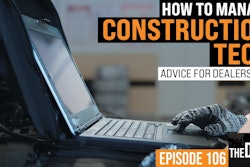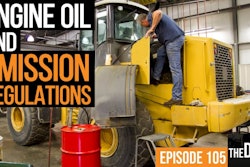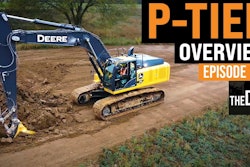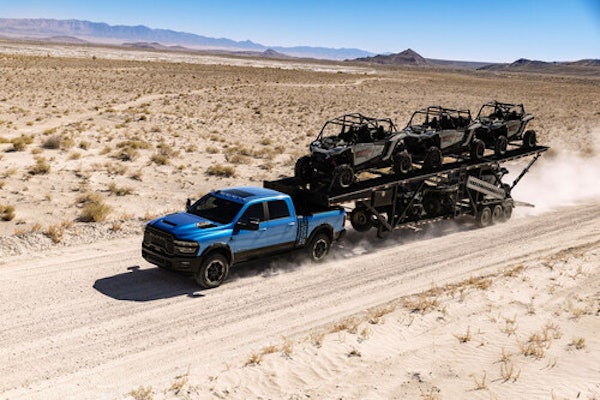Twenty years ago, contractors didn’t give much thought to renting construction equipment. But that’s no longer the case as the rental industry has seen a dramatic rise in recent years.
In this episode of The Dirt, we hear from Josh Nickell, vice president of the equipment segment for the American Rental Association, who gives us a more detailed look at who’s renting equipment and why and what contractors need to know about the rental market.
Nickell reports that about half of the equipment on today’s jobsites are rentals. One leading segment of this trend has been younger contractors, who are comfortable with the sharing economy. Also as uncertainty about the economy heightens, some contractors are finding rental to be an appealing solution.
To learn more about the equipment rental industry and if renting makes sense for you, check out the latest episode of The Dirt.
Equipment World serves up weekly videos on the latest in construction equipment, work trucks and pickup trucks – everything contractors need to get their work done. Subscribe and visit us at equipmentworld.com!
In This Episode:
00:00 - Intro: How Renting Equipment Can Help Your Business
00:28 - How Has the Rental Industry Changed in the Past 10-20 Years?
01:37 - Why Is More Equipment Being Rented Now?
02:27 - Why Is Renting Equipment More Sustainable Than Owning It?
04:28 - What Are the Advantages of Renting Equipment?
06:00 - Is It More Expensive to Rent Equipment?
09:31 - Why Renting Equipment Is More Efficient
12:06 - How Renting Can Help Grow Your Business
13:02 - How Will the Rental Industry Change in the Next 10-15 Years?
15:56 - Final Thoughts
Bryan Furnace (00:00):
Hi everybody. Welcome back to Equipment World. You're watching The Dirt. I'm your host, Brian, and today we're here to speak with Josh Nickell about the rental industry and how it can actually have a pretty tremendous impact on your business as you start to grow, and it can impact your business in more than one way, as you'll soon find out. So without further ado, here's Josh.
(00:28):
So my first question for you is the rental market overall in the equipment industry, has it remained pretty consistent over the past 10 to 20 years, or is that something that we're seeing a lot of changes in?
Josh Nickell (00:40):
It's actually really changed a lot. Compared to a lot of other industries, including the construction industry, the rental industry's really young. I mean, the association [inaudible 00:00:49] itself really started in the fifties. Most associations are hundreds of years old. And the modern rental industry has really been coming out of the early 2000s.
(00:56):
I mean, there were no national rental companies over 20 years ago. There were no giant rental companies. So it's really been changing. Add on to that, America's always been an ownership economy. We wanted to own our house, we want to own our boat, we want to own our excavator. And it's not really until about the last two decades that that has changed that much. We've gone from most contractors owning everything to, in the last few years, rental penetration, which is the percentage of equipment on the job site that's rented versus owned being over 50%.
Bryan Furnace (01:28):
Wow.
Josh Nickell (01:28):
So in just a few decades, going from nothing being rented to over 50% of a job site being rented. So it's really gone through quite an evolution.
Bryan Furnace (01:36):
Interesting. So my next question is, do you think this is tied to the next generation coming into the workplace? Are they the ones that are really fueling this change, or is it existing contractors that are starting to just think about the way they are costing their equipment differently?
Josh Nickell (01:53):
The last 20 years I would say is the existing contractors realizing the value of rental. Realizing, hey, I'm a great plumber, I'm a great electrician, I'm not an asset manager. I don't want to deal with mechanics on staff or logistics and delivery drivers and equipment replacement cycles. So they have certainly started to change that, but younger generations are really accelerating it.
(02:14):
I mean, when you look at Millennials and Zennials, sharing economy as a term, it's something that they use regularly. The idea of access versus ownership isn't a new concept to them. It's a comfortable concept. And even things like sustainability, I don't know that rentals started with the idea of we're going to be a sustainable part of the construction industry, but we did a study a number of years ago and found that rental versus ownership cuts carbon emissions by 30 to 60%. And that's something a lot of younger people care about. So it's just-
Bryan Furnace (02:41):
How does that work? Explain that one to me. That's intriguing to me.
Josh Nickell (02:45):
Yeah, it is surprising the first time you hear it, but when you think about it, there's a lot of things that an equipment rental company does at scale that's harder for individual contractors to do. A simple example of that would be if you have an excavator on a job site, and you're going to eventually need it on another job site, what do you do? Well, typically that excavator's going to sit there for a little while. So it's going to be sitting there degrading. Once that is ready to go to the next job site, then you have to have a person, a truck and a trailer or some sort of vehicle to transport it to that other job site. It's probably going to go from that one job site to the next job site. And then both of those things are going to sit for a little while.
(03:21):
Whereas when you look at a traditional equipment rental company, what's going to happen is first thing in the morning a bunch of pieces of equipment are going to be loaded up. They're going to go out and they're going to stop at multiple contractors on the way, dropping those pieces of equipment off. Then once the vehicle's unloaded, they're going to stop at multiple contractors on the way back loading equipment up. So even just that delivery portion of it is more efficient. Then you have-
Bryan Furnace (03:44):
There's a lot more efficiency. Yeah.
Josh Nickell (03:45):
Yeah, a lot of that. And then you add onto it more things like during that first five years of the piece of equipment's life, there's really nothing that's going to go wrong with them. Of course you got your occasional warranty issues, but it's just like a car. It's just general maintenance for the most part you do in the first five years. So if we can use that piece of equipment as efficiently and as effectively as possible during that really usable life cycle, you can get a lot more use out of it before it ages out or starts breaking down just through sitting out and being in the elements. So it's a lot of little things like that that you put together that make it more efficient and more sustainable.
Bryan Furnace (04:20):
Interesting. Those are two dots that I never would've connected at all. That's interesting.
Josh Nickell (04:27):
It is strange, isn't it?
Bryan Furnace (04:28):
So I know you're going to have a little bit of bias here, but what are some of the advantages of renting over just outright owning your equipment? Like you said, America is traditionally we like to own our stuff. "It's mine."
Josh Nickell (04:43):
We do, we do.
Bryan Furnace (04:43):
What are the advantages of renting?
Josh Nickell (04:46):
So I am not a person who would say you should rent everything. There are certainly cases where ownership makes sense and is a better option for people. I think where renting is a really good addition to a fleet is when there's things like uncertainty. Right now there's fears of recession, there's supply chain issues, interest rates are going up. That's a great time to rent because you don't have to know what the future looks like when you're renting. You can take on different jobs. So let's say the job that I take on today needs a small mini excavator that can fit through a 30 inch doorway or something, and the job that I take next week requires a bigger excavator to dig [inaudible 00:05:23] or something. I don't have to own one piece of equipment that does all those things.
(05:28):
I can also focus on what I'm best at. We talked about earlier how much contractors love their jobs. And when you're an electrician or a plumber, what are you great at? You're great at doing electrical work. You're great at plumbing. You're not say a great asset manager. And so it doesn't mean that you don't own some things, but you don't have to be an asset manager to be a plumber. Go be a great plumber and let somebody who's a great asset manager handle the assets for you. And so those are just some of the times where rental rears its head and makes for a really good opportunity.
Bryan Furnace (06:00):
Now, I don't want to put you on the spot. I already can hear it even through the computer speakers as you and I are conducting the interview, "It's more expensive and you can never be competitive if you rent your equipment." What is your response to that?
Josh Nickell (07:33):
I love it, and it is certainly something that we hear a lot. Everything costs money, but if you had a contractor where you were really able to do the studies, and some of these large contractors have been able to do some of this, there's a lot more cost than the payment on that piece of equipment. It's not like even a truck that you use twice a day to get to and from work. It's something that you have to have mechanics on staff. Now equipment is getting so complicated, you have to have a computer to hook to that piece of equipment just to change the spark plugs.
Bryan Furnace (08:12):
Along with a very hefty piece of software to go along with it, not just the laptop.
Josh Nickell (08:16):
A hefty piece of software. Yeah. You've got to have insurance on that mechanic. You've got to have a truck. You've got to have a trailer. You've got to have vehicle and commercial liability for your auto. You've got to have inland marine coverage on that piece of equipment. You've got to cycle that piece of equipment. So you've got to have somebody who can buy that equipment and sell that piece of equipment at the end of its lifecycle. You've got to make those decisions. You've got to track that piece of equipment. There's so many things that go into ownership that is what I would call squishy data. At scale you can track it, but as a smaller contract, it's squishy data. And that's one of the reasons why we see rental penetration continue to increase over time. Because once a contractor I think does it for a little while or does it in some categories, they're like, "This is really nice. This is not as much of a hassle."
(09:03):
I mean, when you go out to a job site and you look around, look at the rented equipment versus the owned equipment. Which stuff's newer? Which stuff's in better shape? When the piece of equipment goes down on your job site, you want it to be the rental piece of equipment because they're going to give you a brand new one. If your piece of equipment goes down on the job site, you're stuck. You can't do anything. And so I think it's all those costs that are really, I get it, they're squishy costs, but really bring a lot of value and cancel out that rental cost in a lot of cases.
Bryan Furnace (09:32):
Just to double down on everything you just said, this is actually something that my business partner and I use a lot in our business. We take on a variety of different jobs. Sometimes we need a little eight ton excavator, sometimes we need a 35 ton excavator. It just depends on the job. So it doesn't make sense to us to go out and purchase four different excavator sizes to have three of them sitting at any given time while we go out and do this job over here.
(09:55):
And so for us to be able to have our core backbone of equipment that we own and we maintain ourselves, and then be able to flex up or down wherever we need to on the additional machines has been super handy. And I'll even take it a step further on your squishy costs. One of my favorite aspects of this industry are the guys that are convinced that running a 15 year old excavator that is totally paid off, that you can find parts from the scrapyard for it, is the way to go.
(10:22):
And one of those things I go, "But you're not taking into account the efficiency of the work that you're doing. Yes, you're getting the work done, but if I could run a brand new excavator next to your 15 year old one that's barely getting by, how much more productive am I being? And if my hourly costs are X and it takes you 20 or 30% longer just because you have an old tired machine, that's 20 to 30% more cost you have into the job over this newer machine that I was able to go down the road and rent, and it only costs me 10% more in actual material money cost." So there's a lot of factors that go into it that really a lot of guys I don't think truly consider.
Josh Nickell (11:04):
Yeah, I'd love to key off of that too, because if you look 20 years ago, what was the first piece of equipment on a job site? It was a full size backhoe. And back then many excavators didn't really even exist. They had just started coming into the market. And the reason the full size backhoe ruled the job site is because you needed something that could do everything, because you needed to own something. But a mini excavator is far more efficient at excavation than a full size backhoe is. But if you have to pick one unit, you pick that. For landscapers, on the other end of the spectrum, the mini skid steer didn't exist 20 years ago. Because if you bought a unit, you bought a rubber track skid steer, right? But a mini skid steer can do the work of three people. And it wasn't until customers had the ability to rent and flex that size that they could say, "You know what? I don't need a full size backhoe today. I can use a mini excavator. I don't need a full size skid steer. Actually, a mini skid's a better option for me today." But when you own, you have to have that asset that does everything well, but not everything great.
Bryan Furnace (12:06):
Another aspect that occurs to me where rental has been super handy is, not that you're getting outside of your scope of work as a contractor, for instance, we do land clearing, but we may not do the full scale, heavy land clearing that some other contractors would that require ownership of a dedicated mulcher unit. We're just never going to be there. But we might land one of those jobs where it makes sense for us to go out for two to three weeks and rent a dedicated mulcher unit. Those are yet another instance to where you can very easily flex up on your business and you can take that job even though you don't outright own the equipment.
(12:40):
And then the beautiful thing, like you said, is first of all, if anything breaks down, I'm calling Josh and he's going to have a good unit out here tomorrow. And then secondly, as soon as we're done with it, I don't have to worry about maintaining that machine. It's off my books, it's on down the road, and we get to continue on life without having all of the overhead of having to maintain that very, very expensive piece of equipment.
Josh Nickell (13:01):
Absolutely. I couldn't have said it any better.
Bryan Furnace (13:03):
So my last question for you is, as you kind of look forward into the next 10 to 15 years, how do you see the rental landscape continuing to change?
Josh Nickell (13:11):
So a couple things that I think will change in the rental landscape is we'll continue to see better rental penetration. Again, as this new generation takes over and sees more value in rental and gets that value better. As rental companies get more common, there's still a lot of areas without enough access to high quality rental equipment. I think that will increase some things. But the other thing that I think you're going to see is rental companies, manufacturers and the end user, the contractor working together closer on a construction job site.
(13:40):
The age old idea was a piece of equipment is out on rent and fully utilized if it's on a customer's job site. But that creates waste in the supply chain. Really, if you're out there using it on your job site, that's great, but if it's just sitting there and you're not using it, I really should be helping you get that back and get it out to another contractor that could use it. That's better for me. That's better for you. That's a better use of capital and the assets.
(14:05):
And so I think you're going to see connected sensors, the connected job site, better data analytics, better telematics far beyond GPS that allow the contractor, the rental company and the manufacturer to make decisions together to improve the whole construction ecosystem.
Bryan Furnace (14:21):
Interesting. And it does occur to me that now that you've just said that, kind of going back to your carbon emissions and everything, if you're able to rotate assets among different contractors, kind of going back to public transportation versus everyone owning their own car, ultimately if you're removing pieces of equipment because instead of five different contractors owning five different excavators, if five contractors could share two excavators and rotate them, you're essentially creating less waste from the production standpoint. You're producing less emissions through the actual exhaust of the machines, you're having a much bigger impact on the industry than what you're initially thinking about there.
Josh Nickell (15:06):
It's so true. I actually had this debate recently with somebody who wrote a book on the sharing economy, because they didn't initially feel like rental was part of the sharing economy. And realistically, I would say that rental's just professionalized share. There is a middle person, and so it's not contractor to contractor, it's not peer-to-peer, but that's how it really started. It was contractors and repair shops who were like, "I've got this stuff. This other person needs it. I'm going to let them borrow it at a cost." And then that got professionalized to where there's a middle person in there who can maintain it, make sure that it gets swapped out when it needs to be swapped out, handle the logistics, handle the replacement cycles. It's really just professionalized sharing.
Bryan Furnace (15:46):
Well, Josh, this has been interesting. I know most people don't think of rental as the most interesting topic, but this has been really interesting and informative. I appreciate it.
Josh Nickell (15:55):
Thanks for having me here. I appreciate it.
Bryan Furnace (15:57):
Well, thank you again to Josh for taking the time to come on the show and discuss the rental game with us. It is interesting in how many different ways you can utilize rental equipment to help grow your business in a sustainable and not overly risky way, if you will. So again, thank you to Josh for coming on the show. I hope this helps you in your business. We'll catch you guys next time on The Dirt.








